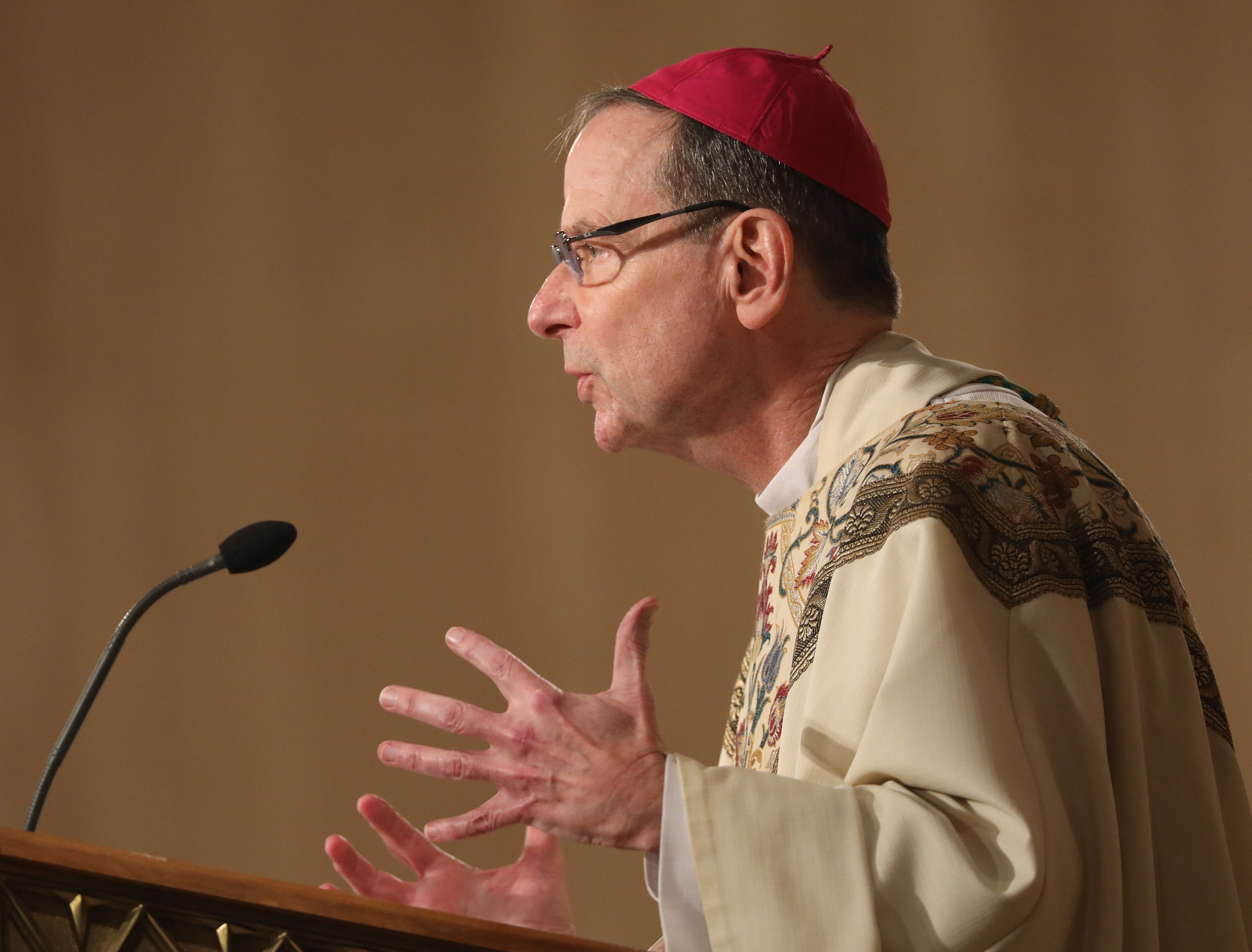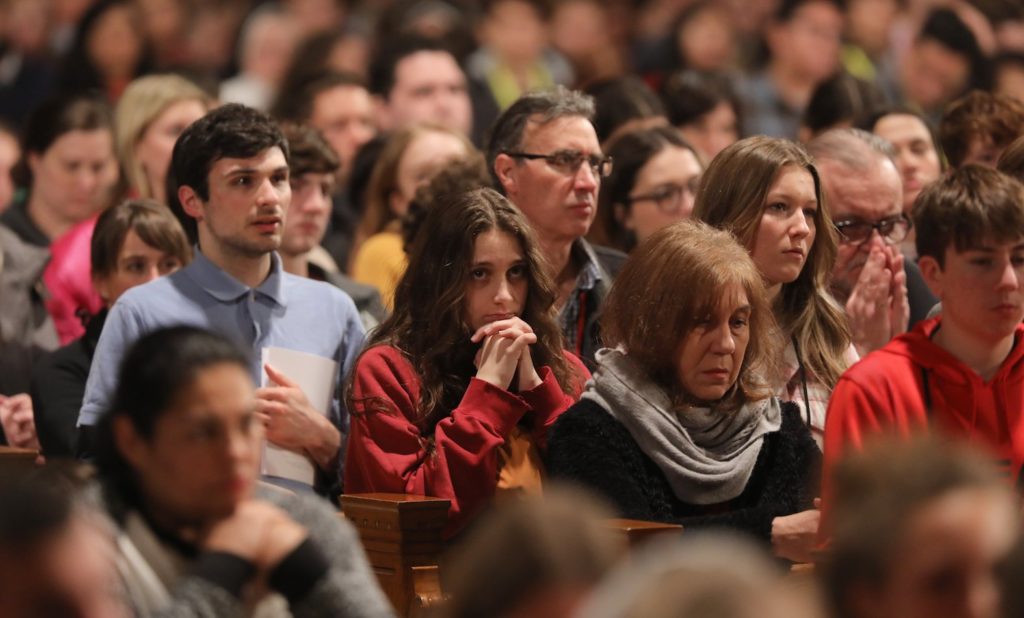The pro-life movement has "much to celebrate" because Roe v. Wade "is no more," said Bishop Michael F. Burbidge of Arlington, Virginia, in his homily Jan. 19 for the National Prayer Vigil for Life's opening Mass at the Basilica of the National Shrine of the Immaculate Conception in Washington.
But a "new important phase" for the cause of life "begins now," he said. "Our efforts to defend life must be as tireless as ever" to change not only laws but also hearts "with steadfast faith in the grace and power of God to do so."
"Our strength is our vigilance," he added.
Those in public office, including Catholics, who "endorse policies that protect or grow the evil of abortion" also "must know that they are accountable," said the bishop, who is chairman of the U.S. Conference of Catholic Bishops' Committee on Pro-Life Activities and the main celebrant of the Mass.
"We will all stand before God to account for what we did or did not do to safeguard his children," he said. "This is especially true for those who profess our faith and have the greatest opportunity to protect the child in the womb."
He said the cause of life is best served by "deepening our understanding of all the dimensions of this issue" and learning new ways to communicate with love "the harsh reality of abortion."
Bishop Burbidge also called for respectful dialogue with those who disagree about abortion, adding that endless "tweets and retweets," "triumphalism" and similar approaches will not bring about a victory for life.
The Mass drew between 6,000 and 6,500 people, with most of the congregation filling the Great Upper Church. Dozens also viewed the Mass on screens set up on the lower level of the basilica.
Concelebrants included cardinals, archbishops, bishops, abbots and priests. Among them were Archbishop Timothy P. Broglio of the U.S. Archdiocese for the Military Services, president of the USCCB; Cardinal Seán P. O'Malley of Boston; Archbishop Christophe Pierre, apostolic nuncio to the U.S.; and two past chairmen of the USCCB's pro-life committee, namely Archbishops Joseph F. Naumann of Kansas City, Kansas, and William E. Lori of Baltimore, who was elected USCCB vice president in November.
Archbishop Pierre read a message from Cardinal Pietro Parolin, Vatican secretary of state, issued on behalf of Pope Francis, who prayed that God would strengthen people's commitment to protecting human life at every stage. The pontiff imparted his blessing on all those participating in the Jan. 20 March for Life in Washington.
"His Holiness trusts that Almighty God will strengthen the commitment of all, especially the young, to persevere in their efforts aimed at protecting human life in all its stages, especially through adequate legal measures enacted at every level of society," the message said.
The spectrum of life issues was illustrated by those who brought the offertory gifts to the altar: a young blind woman guided by her service dog and a friend, a father with his 7-month-old daughter and a mother with her toddler who had Down syndrome.
Before the Liturgy of the Eucharist, the congregation said a "Prayer for Pregnant Mothers," which said in part: "Guide us as we strive to make our parish communities places of welcome and assistance for mothers in need. Help us become instruments of God's love and compassion."
The Mass was followed by a "Holy Hour for Life," which launched a series of Holy Hours of Eucharistic devotion throughout the night in dioceses across the country. An 8 a.m. Mass Jan. 20 to close the vigil was celebrated by Auxiliary Bishop Joseph L. Coffey of the U.S. Archdiocese for the Military Services.
In his homily, Bishop Burbidge called the U.S. Supreme Court's 1973 Roe vs. Wade ruling that legalized abortion nationwide "a blight on our nation, our system of justice and our culture."

Last June, the court overturned Roe in its ruling in Dobbs v. Jackson Women's Health Organization decision, returning the issue of abortion to the states.
Dobbs "is a moment for joy, and for gratitude; a moment to recall the countless souls who have dedicated themselves to political and social action, to prayer and to service in the name of this cause," Bishop Burbidge said. "Today we make the gratitude of today's psalm our own: 'O Lord, our God, how wonderful your name in all the earth.'"
In a post-Dobbs world, efforts must continue to end policies "target vulnerable global populations with abortion funding or that facilitate alternative means of abortion at home."
And "we must turn a greater share of our attention to our local communities, from where we may cultivate opportunities in our states to limit the scope of legalized abortion, to curb its funding, or ideally, ban it all together," Bishop Burbidge said.
Pro-life work begins "with our knowledge of the truth" about abortion "and our courage to speak it," he said. "We must learn new and compelling ways to communicate the harsh reality of abortion and the damage it inflicts on children, mothers, fathers and society more broadly."
He urged Catholics to draw on philosophy, the social sciences, technology and psychology, as well as experts "who understand the landscape on the federal and state levels" -- and to coordinate "our efforts, strategies and resources in pursuit of making abortion in our nation unthinkable and illegal."
He reminded the congregation that "lasting victories will not come from views or hits or retweets; nor from triumphalism, bitterness, or cynicism; but from our sincere efforts to effect true conversion of mind and heart."
"Efforts to persuade rather than attack" will win the day, he said, calling for "engaging in respectful discussion" and "acknowledging the dignity of those with whom we disagree."
"While we hold public officials accountable, we must remember that each of us is accountable also," Bishop Burbidge said.
Pope Francis, he said, has laid out "our task" with these words: "The secret of Christian living is love. Only love fills the empty spaces caused by evil."
These "empty spaces" are "where our words must be matched by our actions," Bishop Burbidge said. "Our work will not be complete until God's love is felt in every empty space created by abortion."
"Empty spaces" became a refrain in his homily.
"Into the empty spaces of public discourse on abortion, may we bring clarity and charity in communicating with our opponents," he said. "Into the empty spaces of our wounded politics, may we communicate the need to let go of partisanship and to do what is right and just.
"Into the empty spaces of culture, may we celebrate truth, beauty and God's goodness," he continued. "Into the empty space of fear and loneliness experienced by women facing an unplanned pregnancy, may we offer God's peace and hope and our untiring commitment to walk with them at every moment.
"Into the empty spaces within the lives of mothers and fathers who mourn from children lost to abortion," he said, "may we gently voice God's endless comfort and mercy."

